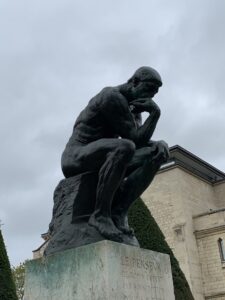 The field of coaching continues to evolve as research informs practice and client needs take center stage. One recent evolution is called “third generation” coaching. This includes the shift to embracing “thinking partnerships” with clients rather than being experts and advisors. It is also slowing down from a solution focus and taking time to explore who the client is, based on values and understanding the meaning clients make from those values. Instead of simply focusing on a goal, clients are also focusing on passion and purpose which requires coaches to use a different yet complementary set of skills when coaching. The intersection of compassionate coaching, eclectic coaching, third-generation coaching, and vertical development represents the highlights of the thinking partnership as it offers a comprehensive and integrated approach to personal and professional growth that encompasses cognitive, emotional, relational, and systemic dimensions.
The field of coaching continues to evolve as research informs practice and client needs take center stage. One recent evolution is called “third generation” coaching. This includes the shift to embracing “thinking partnerships” with clients rather than being experts and advisors. It is also slowing down from a solution focus and taking time to explore who the client is, based on values and understanding the meaning clients make from those values. Instead of simply focusing on a goal, clients are also focusing on passion and purpose which requires coaches to use a different yet complementary set of skills when coaching. The intersection of compassionate coaching, eclectic coaching, third-generation coaching, and vertical development represents the highlights of the thinking partnership as it offers a comprehensive and integrated approach to personal and professional growth that encompasses cognitive, emotional, relational, and systemic dimensions.
Compassionate Coaching
Compassionate coaching is an approach to coaching that emphasizes empathy, kindness, and understanding in the coach-client relationship. It involves fostering a supportive and nonjudgmental environment where clients feel safe to explore their thoughts, feelings, and challenges. Compassionate coaches prioritize the well-being and growth of their clients and work collaboratively with them to achieve their goals and aspirations.
In their book "Resonant Leadership: Renewing Yourself and Connecting with Others Through Mindfulness, Hope, and Compassion," Richard Boyatzis and Annie McKee discuss the role of compassion and empathy in effective leadership and coaching. They emphasize the importance of building trusting, empathetic relationships with others and creating environments that support growth, learning, and positive change.
Additionally, Boyatzis has written about the concept of "coaching with compassion" as part of his research on emotional intelligence and coaching effectiveness. He suggests that compassionate coaching involves not only providing feedback and guidance but also empathizing with clients' experiences, validating their emotions, and supporting their personal and professional development with care and understanding.
Principles and characteristics of compassionate coaching include empathy and understanding, nonjudgmental support, positive regard and respect, collaborative partnership, focus on well-being, strength-based approach, encouragement, and self-compassion. Overall, compassionate coaching embodies the qualities of empathy, kindness, and understanding, creating a nurturing and empowering environment for clients to explore, grow, and thrive. By fostering a deep sense of connection and trust, compassionate coaches empower clients to overcome obstacles, unlock their potential, and create positive change in their lives.
Third Generation Coaching
Third generation coaching refers to an approach to coaching that emphasizes a holistic and systemic perspective, focusing not only on individual goals and behaviors but also on the broader context in which individuals operate. This approach integrates elements from various coaching models, theories, and disciplines to address the complex interplay between individuals, organizations, and society.
Elements of third generation coaching include systems thinking, contextual awareness, co-creative partnership, focus on meaning and purpose, strength-based approaches, ethical and social responsibility, and integrative practices. It moves beyond models, processes, and theories to an integrational view of coaching inclusive of the aforementioned principles.
Several authors have contributed to the definition and understanding of third generation coaching. Clutterbuck in "Coaching the Team at Work" shares the principles and practices of team coaching and the need to align with the systemic and relational focus of third generation coaching. Nancy Kline, the author of "Time to Think: Listening to Ignite the Human Mind," emphasizes the importance of creating a thinking environment in coaching and leadership development. Her work promotes deep listening, inquiry, and reflection, which are central to the principles of third generation coaching. Reinhard Stelter, a Danish psychologist and professor shares that values, meaning making and co-creative partnerships are central to coaching and that coaching is primarily focused on facilitating transformative change in clients' lives. This involves supporting clients in exploring their values, beliefs, and aspirations, and aligning their actions with their authentic selves.
Overall, third generation coaching represents an evolution of coaching practice that embraces complexity, interconnectedness, and the inherent dignity and potential of individuals within larger systems. By adopting a systemic and holistic approach, coaches in the third generation help clients navigate change, cultivate resilience, and thrive in an increasingly complex and dynamic world.
Eclectic Coaching
Eclectic coaching is an approach to coaching that draws on a variety of techniques, theories, and methodologies from different schools of thought. Rather than adhering strictly to one specific coaching model or framework, eclectic coaches tailor their approach to the unique needs, goals, and preferences of their clients. They integrate elements from various coaching approaches, disciplines, and modalities to create a customized coaching experience that is most effective for the individual client.
Characteristics and principles of eclectic coaching include flexibility, integration of techniques, client centered approach, holistic perspective, continuous learning, and development, non-dogmatic, and results oriented. While eclectic coaches may use a variety of techniques and methodologies, they remain focused on helping their clients achieve their desired outcomes and results. They monitor progress, provide accountability, and adjust their approach as needed to ensure that clients make meaningful progress towards their goals.
Jonathan Passmore in his book "Excellence in Coaching: The Industry Guide," discusses the importance of flexibility and adaptability in coaching, advocating for an eclectic approach that draws from multiple coaching models and techniques. Taking a self-coaching approach, Tony Grant and Jane Greene in "Coach Yourself: Make Real Changes in Your Life," explore self-coaching techniques and strategies. Their work also acknowledges the importance of an eclectic approach to coaching, where individuals can draw from a range of tools and methods to support their personal development.
Overall, eclectic coaching offers a flexible and dynamic approach to supporting individuals in achieving personal and professional growth and development. By integrating diverse techniques and perspectives, eclectic coaches can meet the unique needs of each client and facilitate transformative change in their lives.
Vertical Development
 Vertical development in organizations refers to the process through which individuals, teams, and entire organizations evolve and mature in their cognitive, emotional, and moral capacities. Unlike horizontal development, which involves acquiring new skills or knowledge within a particular domain, vertical development entails progressing to higher stages of complexity, depth, and maturity in how individuals and groups make sense of themselves, others, and the world around them. Vertical development in organizations focuses on leadership development, organizational culture, team dynamics, change management, performance management and learning and development programs at every level.
Vertical development in organizations refers to the process through which individuals, teams, and entire organizations evolve and mature in their cognitive, emotional, and moral capacities. Unlike horizontal development, which involves acquiring new skills or knowledge within a particular domain, vertical development entails progressing to higher stages of complexity, depth, and maturity in how individuals and groups make sense of themselves, others, and the world around them. Vertical development in organizations focuses on leadership development, organizational culture, team dynamics, change management, performance management and learning and development programs at every level.
Authors who have contributed to this body of work include Robert Kegan, Suzanne Cook-Greuter, Bill Torbet, and Otto Laske. Kegan in "The Evolving Self," introduced the concept of "orders of consciousness," which describes different stages of cognitive and emotional development that individuals progress through over their lifespan. Cook-Grueter developed the "Maturity Assessment for Professionals" (MAP), which assesses individuals' stage of ego development based on Kegan's framework. Her research emphasizes the importance of self-awareness and reflective practice in facilitating vertical development. Torbet’s research focused on "action logics" and describes different ways of making meaning and leading in organizations, ranging from more conventional, rule-based approaches to more complex, adaptive, and interdependent ways of leading. Finally, Laske offers a framework which emphasizes the importance of dialectical thinking, perspective-taking, and self-authorship in facilitating vertical development.
These authors, among others, have contributed to the understanding of vertical development and its implications for personal, professional, and organizational growth. Their work highlights the importance of ongoing learning, self-reflection, and transformative experiences in fostering higher levels of cognitive, emotional, and moral complexity. Vertical development in organizations is crucial for fostering adaptive, resilient, and innovative workplaces that can thrive in today's complex and rapidly changing environments. Overall, vertical development in organizations is essential for building adaptive, resilient, and high-performing workplaces that can thrive in today's complex and dynamic business environment. By prioritizing personal and collective growth, organizations can unlock their full potential and achieve sustainable success.
In summary, the intersection of compassionate coaching, eclectic coaching, third-generation coaching, and vertical development offers a holistic and integrated approach to coaching and personal development. Coaches draw from a diverse array of tools, techniques, and theories to create a supportive and empowering coaching environment that honors the uniqueness and complexity of each client's journey. By embracing principles of compassion, flexibility, transformation, and growth, coaches can facilitate deep and sustainable change that enhances individuals' well-being, effectiveness, and fulfillment in all aspects of their lives.
Join us for a webinar on April 3, 2024 at 11 AM EST for a deeper discussion of “The Critical Thinking Partnership in Coaching"
Click here to register for this Webinar.